Space and earth план урока 7 класс
Обновлено: 02.07.2024
воспитание потребности в практическом использовании английского языка, любви и уважения к достижениям отечественной науки.
развитие памяти и способности к восприятию изученной лексики; формирование интереса к изучению космоса, к строению солнечной системы, к достижениям и развитию космической индустрии и астрономии.
Задачи урока:
Практиковать языковые навыки;
Тренировать в употреблении в речи и в понимании лексики по теме "Развитие космонавтики. Планеты Солнечной системы";
Формировать интерес учащихся к изучению английского языка;
Воспитывать патриотическое отношение к Родине (акцентируя внимание на заслуги советской и российской космонавтики перед мировой наукой и техникой).
Оснащение урока
раздаточный материал в виде карточек с названиями планет, писем- шифровок, карточек для заполнения пропусков ;
материал для изготовления костюмов (мешки, клейкая лента, стиплер, ножницы).
ОРГАНИЗАЦИОННЫЙ МОМЕНТ
Представление команд, каждого участника, капитанов.
ОСНОВНАЯ ЧАСТЬ
You must pass the exam before our trip.
Экипажи отвечают на 5 вопросов по очереди (презентация).
Reddish sky above
The vast canyon
The fourth planet
The huge volcano
Named for the god of war (Mars)
Rings and moons
Takes 160 to go round the sun(Neptune)
The farthest planet
Sometimes it is closer to the sun (Pluto)
Spins at an angle
Pale blue-green cloudy atmosphere
15 moons and two rings
42 years of sunlight
42 years of darkness (Uranus)
The hottest planet
Named after the god of truth and justice (Venus)
The large bright object in the sky that gives us light and heat, and around which the Earth moves (The Sun)
The planet that we live on (Earth)
A machine that has been sent into space (a satellite)
The round object that you can see shining in the sky at night (the Moon)
You have passed the exam; let’s go to the Solar System and put the planets in the correct order to the Sun.
Это задание выполняется участниками (4 человека), где необходимо быстрее другого экипажа расставить названия планет в том порядке, как они движутся вокруг Солнца. Участники выстраиваются в шеренгу в том порядке, как планеты расположены по отношению к Солнцу, держа карточки в руках.
Капитаны по очереди отвечают на вопросы из презентации.
When was the first man’s flight to the open space? (12.04.1961)
What country was the first to send a man to the space ? ( The USSR )
What’s the first man’s name who had been in space ? (Y.Gagarin)
How is the first space rocket of the USSR called? (Vostok)
Name the cosmodrome ,the spacecraft started from .(Baikonur)
How long Yurii Gagarin has been in the space ? (108 min)
What’s her name? It’s a woman who was the first among the women to have flight to the space. (V.Tereshkova)
Who and when made the first going out to the open space ? (A. Leonov)
It ’ s time to make the outfit for the open space travelling using some materials (звучит музыка, участники на время из подручных средств мастерят космический костюм)
Alien ’ s letters (Конкурс расшифровки инопланетных писем)
We have received the space letter, you must decode it.
Команда расшифровывает инопланетные письма-послания.
ПОДВЕДЕНИЕ ИТОГОВ УРОКА, ПОДСЧЕТ БАЛЛОВ, СЛОВО ЖЮРИ
Here are cards. Complete the text with the right word. Answer the question, while our jury is working (команды получают задание , пока жюри подсчитывает баллы )
Заполнить пропуски нужными словами
In March 2004 a new planet was_____1_____ 10 billion kilometers from the Earth and was named Sedna. It was found by the Hubble _____2_____. Some people say Sedna is not really a planet. Anyway, the news _____3____ very exciting because the planet _____4____ beyond the planetary Solar System. Space now has become _______5______! Such countries as Russia, the USA and Japan are planning to send more money on it. Do you think space exploration so important?
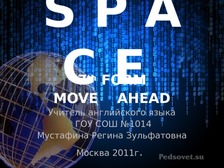
Слайд 1
SPA CE 7 FORM MOVE AHEAD th Учитель английского языка ГОУ СОШ №1014 Мустафина Регина Зульфатовна Москва 2011г.
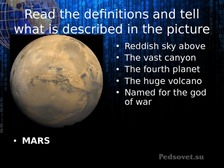
Слайд 2
Read the definitions and tell what is described in the picture • • • • • • MARS Reddish sky above The vast canyon The fourth planet The huge volcano Named for the god of war
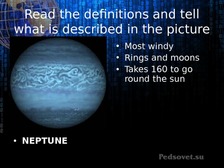
Слайд 3
Read the definitions and tell what is described in the picture • Most windy • Rings and moons • Takes 160 to go round the sun • NEPTUNE
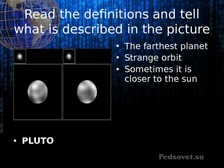
Слайд 4
Read the definitions and tell what is described in the picture • The farthest planet • Strange orbit • Sometimes it is closer to the sun • PLUTO
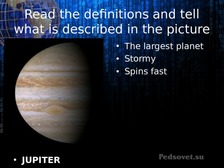
Слайд 5
Read the definitions and tell what is described in the picture • The largest planet • Stormy • Spins fast • JUPITER
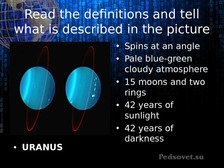
Слайд 6
Read the definitions and tell what is described in the picture • URANUS • Spins at an angle • Pale blue-green cloudy atmosphere • 15 moons and two rings • 42 years of sunlight • 42 years of darkness
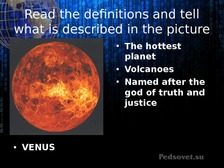
Слайд 7
Read the definitions and tell what is described in the picture • The hottest planet • Volcanoes • Named after the god of truth and justice • VENUS
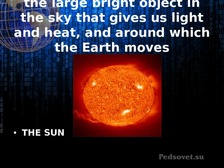
Слайд 8
the large bright object in the sky that gives us light and heat, and around which the Earth moves • THE SUN
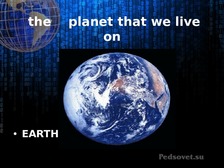
Слайд 9
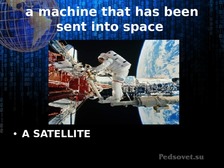
Слайд 10
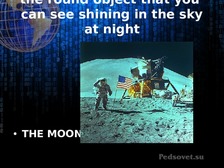
Слайд 11

Слайд 12
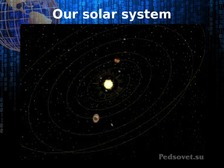
Слайд 13
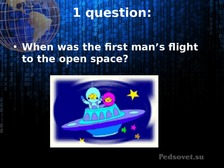
Слайд 14

Слайд 15
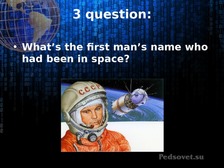
Слайд 16
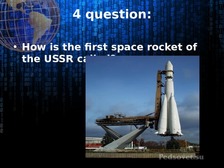
Слайд 17
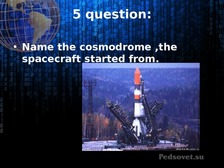
Слайд 18
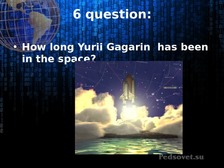
Слайд 19
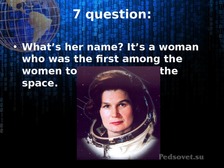
Слайд 20
7 question: • What’s her name? It’s a woman who was the first among the women to have flight to the space.
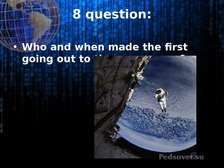
Слайд 21

Слайд 22
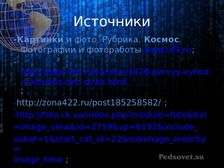
Слайд 23
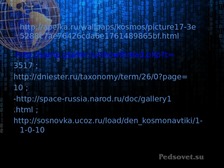
Слайд 24
Полный текст материала Конспект урока-игры + презентация по английскому языку на тему "Космос" для 7 класса смотрите в скачиваемом файле.
На странице приведен фрагмент.
Спасибо за Вашу оценку. Если хотите, чтобы Ваше имя
стало известно автору, войдите на сайт как пользователь
и нажмите Спасибо еще раз. Ваше имя появится на этой стрнице.

Есть мнение?
Оставьте комментарий
Упражнения на технику чтения и понимания прочитанного
Тонкости и секреты работы в Яндекс.Почте
Как работать с детьми с СДВГ в обычном классе?
0 Спам
Отправляя материал на сайт, автор безвозмездно, без требования авторского вознаграждения, передает редакции права на использование материалов в коммерческих или некоммерческих целях, в частности, право на воспроизведение, публичный показ, перевод и переработку произведения, доведение до всеобщего сведения — в соотв. с ГК РФ. (ст. 1270 и др.). См. также Правила публикации конкретного типа материала. Мнение редакции может не совпадать с точкой зрения авторов.
Для подтверждения подлинности выданных сайтом документов сделайте запрос в редакцию.
О работе с сайтом
Мы используем cookie.
Публикуя материалы на сайте (комментарии, статьи, разработки и др.), пользователи берут на себя всю ответственность за содержание материалов и разрешение любых спорных вопросов с третьми лицами.
При этом редакция сайта готова оказывать всяческую поддержку как в публикации, так и других вопросах.
Если вы обнаружили, что на нашем сайте незаконно используются материалы, сообщите администратору — материалы будут удалены.
Цель: усвоение умений самостоятельно в комплексе применять знания, умения и навыки, осуществлять их перенос в новые условия.
практические: совершенствование фонетических навыков, отработка лексического материала, совершенствование навыков аудирования, развитие монологических навыков и умений;
развивающие: развитие навыков чтения, развитие навыков письменной речи, развитие памяти, развитие внимания, развитие логики мышления, развитие готовности к коммуникации;
образовательные: расширение кругозора, повышение общей культуры. воспитательные: воспитание культуры общения, поддержать интерес к учению и познавательной деятельности;
Тип урока: комбинированный.
-Good-morning, boys and girls! (Good-morning, teacher!)
- I am glad to see you! (We are glad to see you too!)
-Who’s on duty in your Class?
-Today we shall start our lesson with the poem “Our Special Earth”. (см. ПРИЛОЖЕНИЕ 1)
-Listen to me please. (Воспроизведение стихотворения учителем)
-Translate the poem. (Перевод стихотворения учащимися)
-Repeat the words after me (Отрабатываемые слова выделены другим цветом) : Earth, Mercury, Venus, Jupiter, Pluto, Mars, Uranus, Neptune, Saturn
-Repeat after me. (Построчное чтение)
-Let's read the poem all together! (Хоровое чтение)
-Answer my questions please (Вопросно-ответная работа по содержанию стихотворения “Our Special Earth”):
1) What is the closest planet to the Sun? (Mercury)
2) What is the hottest planet? (Venus)
3) What is the biggest planet? (Jupiter)
4) What is the smallest planet? (Pluto)
5) What colour is Mars? (Red)
6) Which planet has got rings? (Saturn)
7) Why is the Earth very special?
-As you understand, today we are going to talk about space and space exploration. We don’t know when people began to dream of travelling in space, but this dream became true only in the 20 th century.
-What do you know about exploring space?
Make up sentences. (см. ПРИЛОЖЕНИЕ 2)
- K. Tsiolkovsky invented the idea of space rockets.
- S. Korolev constructed the first space ship.
- Y. Gagarin was the first astronaut.
- V. Tereshkova was the first woman in space.
- A. Leonov was the first man to walk in space.
- N. Armstrong was the first man on the moon.
- Laikav was the first dog in space.
- Dennis Tito was the first space tourist.
- Развитие навыков ознакомительного чтения.
- People of different nationalities have always dreamt about travelling in space. At the end of the 20 th century the countries combined their efforts to build the ISS (the International Space Station).
-We are going to read the text about the ISS (the International Space Station). What is it?
-First of all let’s read some new words and expressions:
- the International Space Station (the ISS) – Международная космическая станция (МКС)
- the European Space Agency - Европейское управление космических исследований
- control module - блок управления
- was launched – был запущен
- scientific research – научное исследование
- weightless – невесомый
- to attach – привязывать
- crew cab - кабина для экипажа
-Read the text to yourself please and say true (T) or false (F). I give you 4 minutes for reading.
(см. ПРИЛОЖЕНИЕ 3)
- Six countries are working together to build the ISS.(False)
- The countries are constructing the ISS piece by piece in space.(True)
- The first part of the ISS was Zarya, the control module, which was built by the USA .(False)
- A few years later the US module Unity was launched. (False)
- The station will be an orbital laboratory for scientific research. (True)
- Five astronauts can live and work on the station. (False)
- In space astronauts are weightless and can sleep in any position. (True)
- Usually, astronauts sleep for five hours at the end of each day. (False)
- Физкультминутка.
-I see you are tired. Let’s have a rest. Stand up please. (см. ПРИЛОЖЕНИЕ 4)
- Развитие видов речевой деятельности (аудирование).
-We go on talking about space. The astronauts live and work in space for several months. But what do they eat in space?
-Look at the food trays (на доске), read the words:
tortillas – Mexican pancakes
brownies – chocolate cakes
candies AmE = BrE sweets
-Listen to the interview (ex. 2b, p.117) and choose which tray is for an astronaut (см. ПРИЛОЖЕНИЕ 5). – 1 прослушивание
-Say if the following statements (см. ПРИЛОЖЕНИЕ 5) are true or false – 2 прослушивание.
- Astronauts eat a lot of fruit and vegetables. (True)
- They eat brown bread. (False)
- They eat tortillas instead of bread. (True)
- Astronauts don’t drink coffee or tea. (False)
- All the drinks are in bags with straws. (True)
- Astronauts have sweets and brownies for their dessert. (True)
- Развитие видов речевой деятельности (письмо: обучение заполнению бланка заявления.)
-I think everyone would like to travel in space and to study our Solar System better. Would you like to travel in space? ( Ответы учащихся )
-Read the words and expressions and choose the three most important things for being a crew member:
- can speak and read English and Russian
- can work in a team
- experienced
- friendly
- healthy
- clever
- kind
- helpful
Слова и выражения записаны на доске.
-Fill in the application form with short statements to give reasons why you should be chosen to be a crew member. (ПРИЛОЖЕНИЕ 6)
-Say why you can be chosen to be a crew member. Use your application.
(Учащиеся составляют монологическое высказывание о себе, используя образец заявления)
-What new have you learnt during this lesson? What was interesting for you to know?
(It was interesting for me to know that …)
-Homework – to learn the poem “Our Special Earth” by heart.
-Good-bye, my dear frinds.
Our Special Earth
Our Earth is very special,
As special as can be,
Though it's not the closest planet
To the Sun--that's Mercury .
It's not the hottest planet,
That's Venus - "Evening Star,"
It's not the biggest planet,
That's Jupiter by far.
It's not the smallest planet,
That's Pluto - cold as ice,
'It's not famous for its reddish tint,
That's Mars - to be precise.
It's not a ball of gas like
Uranus and Neptune ,
It has no rings like Saturn 's,
It only has one moon.
But Earth is alive with animals,
With flowers, grass, and trees.
And best of all our special Earth
Is home to you and me.
What do you know about exploring space?
Make up sentences.
1) K. Tsiolkovsky
a) was the first space tourist.
b) was the first astronaut.
c) invented the idea of space rockets.
d) constructed the first space ship.
e) was the first man to walk in space.
f) was the first dog in space.
g) was the first woman in space.
h) was the first man on the moon.
- the International Space Station (the ISS) – Международная космическая станция (МКС)
- the European Space Agency - Европейское управление космических исследований
- a control module - блок управления
- was launched – был запущен
- scientific research – научное исследование
- weightless – невесомый
- to attach – привязывать
- crew cabine - кабина для экипажа
Read the text and say true (T) or false (F):
The International Space Station (the ISS) is the international programme. Sixteen countries are working together to build the ISS: Russia, the United States of America, Canada, Japan, Brazil, and the nations of the European Space Agency (Belgium, Britain, Denmark, France, Germany, Italy, the Netherlands, Norway, Spain, Sweden and Switzerland).
The countries are constructing the ISS piece by piece in space. It is very big and heavy. The first part of the ISS was Zarya , the control module, which was built by Russia. It was launched into orbit on the 20 th of November 1998. A few weeks later the US module Unity was launched. The two modules were connected in space.
The station will be an orbital laboratory for scientific research in physics, chemistry, biology, medicine, human physiology, space and Earth science. But while building is going on, only three astronauts will live and work on the station.
After a long working day, just like on Earth, a worker in space goes to bed at night. In space astronauts are weightless and can sleep in any position. However, they have to attach themselves to a wall, a seat or a bed inside the crew cabine. Usually, astronauts sleep for eight hours at the end of each day.

7.C6 Organise and present information clearly to others.
7.S1 Use formal and informal registers in their talk on a limited range of general and curricular topics.
Lesson objectives
All learners will be able to:
name all the planets;
Most learners will be able to:
express their ideas;
Some learners will be able to:
answer high order question;
Language objective
learn new vocabulary on the topic
Value links
Cross curricular links
Previous learning
Vocabulary on the topic Space
Use of ICT
Projector or Smart board to show a video
Intercultural awareness
Students will understand that the Earth is home for a huge number of people who are living on it.
Kazakh culture
Pastoral Care
Students will understand that the Earth is the common living place for diverse people who are responsible for it.
Health and Safety
Everyday classroom instructions will ensure that safety measures are provided to prevent from the accidents in a classroom. The classroom is aired before the lesson.
Planned timings
Planned activities
1. Leading-in stage (W)
Teacher greets students and discusses the safety rules in the classroom.
Teacher asks students to name the planets they remembered from the first lesson of this topic (whole group work).
Teacher elicits the answers on the board
Teacher practises the pronunciation of the planets’ names helping students to remember correct pronunciation with the help of video.
2. Teacher tells the students the objectives of the lesson
know new words on the topic
know information about the Earth
3. The main part of the lesson
Teacher asks students to draw the Solar system.
Students share their images with their classmates walking around the room.
Students fix their images on the board
Differentiation
Teacher assists those students who need the help
Students share their answers with their peers (pair work).
Teacher presents students the Solar system image with answers.
Students assess their knowledge of Solar system by comparing their answers with the provided answers (Self-assessment).
Teacher highlights our planet in the picture of the Solar system by asking the question “How is the Earth different from other planets” (What is there on the Earth that the other planets do not have?). Expected answer: Life………
Teacher asks students to check their knowledge by filling the passport of the Earth. Students can choose any points in the passport to fill.
Students discuss their answers in small groups/or pairs and add some information after their discussion.
Differentiation
The number of completing the tasks vary from 3-9. Students can choose any points and number to write about. Teacher gives more help to certain pupils within pairs and/or groups.
Teacher presents the passport that students can read and compare their answers with their own. Students can use dictionaries to find unfamiliar words. Students highlight the information about the Earth in the passport:
Все материалы, размещенные на сайте, созданы авторами сайта либо размещены пользователями сайта и представлены на сайте исключительно для ознакомления. Авторские права на материалы принадлежат их законным авторам. Ответственность за разрешение любых спорных моментов, касающихся самих материалов и их содержания, берут на себя пользователи, разместившие материал на сайте. Однако редакция сайта готова оказать всяческую поддержку в решении любых вопросов, связанных с работой и содержанием сайта. Если Вы заметили, что на данном сайте незаконно используются материалы, сообщите об этом администрации сайта.
© 2014–2021 Қосалқы білімді сайт
Байланыс, ақпараттандыру және бұқаралық ақпарат құралдары саласындағы
мемлекеттік бақылау комитетінен берілген.
Читайте также:

